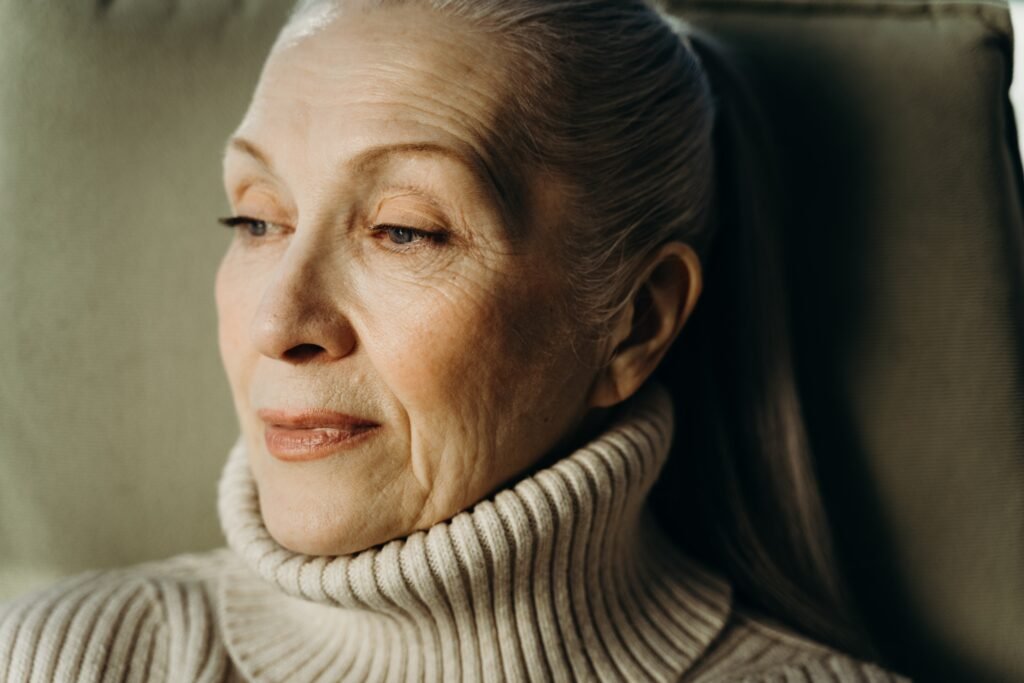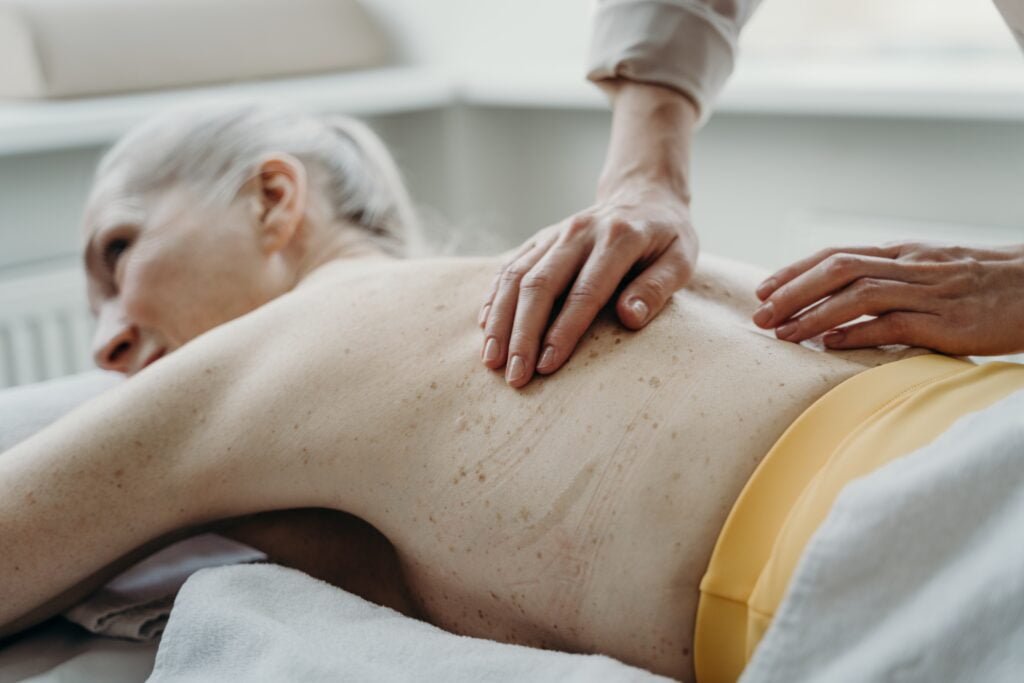Are there unmistakable signs your body is aging faster than you are?
Venture with us as we unravel the intricate tale of time’s impact on our physiology.
Beyond wrinkles and gray hairs, there’s a world of subtle changes that whisper the secrets of our body’s inner clock.
Embark on this enlightening journey to truly understand and embrace the art of aging gracefully.
Some of the links in this post are affiliate links. This means if you click on the link and purchase the item, I will receive an affiliate commision at no extra cost to you. All opinions remain my own. Read more on our Privacy Policy page
1. Wrinkles and Fine Lines
signs your body is aging faster than you are
Effects of Sun Exposure on Skin
Sun exposure is a leading cause of premature aging. Over time, harmful UV rays can damage the skin, leading to wrinkles and other signs of aging. Protecting your skin from excessive sun exposure, especially during peak hours, can help maintain its youthful appearance.
Smoking and Collagen Depletion
Smoking has been linked to reduced collagen production, which is essential for skin elasticity. Over time, smokers may notice an increase in wrinkles and fine lines, especially around the mouth.
Facial Expressions and Aging
Repetitive facial expressions can cause fine lines to form over time, especially around areas like the eyes and forehead. While expressing emotions is natural, being aware of habitual frowning or squinting can be beneficial.

2. Brittle or Gray Hair
The Role of Genetics in Graying
Your genetic makeup often determines the onset of gray hair. Some people may start to gray in their 20s, while others might not see grays until their 40s. It’s essential to understand your family’s history to set realistic expectations for hair aging.
Nutritional Deficiencies and Hair Health
A diet lacking essential nutrients can negatively impact hair health, making it brittle or accelerating the graying process. Consuming a balanced diet rich in vitamins and minerals supports healthy hair growth and color.
The Impact of Stress on Hair
Chronic stress has been linked to premature graying and hair loss. Finding effective stress-management techniques can help in maintaining the hair’s natural color and strength.
3. Reduced Bone Density
Menopause and Bone Health
Post-menopause, women often experience a drop in estrogen levels, which can significantly reduce bone density. Regular check-ups and maintaining a calcium-rich diet can help mitigate the risks.
Calcium Intake for Strong Bones
Calcium plays a pivotal role in maintaining bone strength. Ensuring a diet rich in calcium, along with Vitamin D for absorption, can support bone health as one ages.
The Importance of Weight-Bearing Exercises
Engaging in regular weight-bearing exercises can help maintain bone density. Activities like walking, jogging, or lifting weights can stimulate bone-forming cells and reduce the risk of osteoporosis.
4. Decreased Muscle Mass

signs your body is aging faster than you are
Physical Inactivity and Muscle Loss
Muscle mass naturally decreases with age, but an inactive lifestyle can exacerbate this decline. Engaging in regular strength training exercises helps in retaining muscle mass, promoting metabolic health, and supporting mobility in older age.
The Role of Hormonal Changes
Testosterone and growth hormone levels decrease as one ages. These hormones play crucial roles in muscle maintenance. Being aware of these changes and consulting with healthcare professionals can guide interventions like hormone replacement therapy if deemed appropriate.
Protein: An Essential Muscle Building Block
Adequate protein intake is vital for muscle maintenance and repair. As one ages, protein requirements may increase to counteract muscle loss. Including good quality protein sources in daily diets can support muscle health.
5. Vision Changes
signs your body is aging faster than you are
Presbyopia: The Aging Eye
As one enters their 40s, they may notice difficulty focusing on close-up objects, a condition known as presbyopia. Regular eye check-ups and corrective lenses can help address this natural aging process.
Dangers of UV Exposure to Eyes
Prolonged exposure to UV rays can accelerate eye issues like cataracts and macular degeneration. Wearing sunglasses with UV protection and hats can protect the eyes from harmful rays.
Health Conditions Affecting Vision
Chronic conditions like diabetes can have a significant impact on vision. Regular monitoring and maintaining blood sugar levels within recommended ranges can help in preventing diabetic retinopathy and other vision complications.
6. Hearing Loss
Noise-Induced Hearing Loss
Frequent exposure to loud noises can damage the sensitive structures of the inner ear. Using protective ear equipment in noisy environments and keeping music volumes at safe levels can help protect hearing.
Ototoxic Medications
Certain medications can have adverse effects on hearing. Always discuss potential side effects with healthcare providers and get regular hearing check-ups if on long-term medications.
Illnesses that Affect Hearing
Specific illnesses, such as meningitis or chronic ear infections, can impact hearing. Being proactive about health check-ups and addressing any ear-related symptoms promptly can aid in preserving hearing health.
7. Memory Loss
signs your body is aging faster than you are
The Role of Chronic Stress
Chronic stress can impair cognitive functions, including memory. Implementing stress-relief techniques such as meditation, yoga, or deep-breathing exercises can potentially benefit brain health.
Sleep and Cognitive Function
Quality sleep is essential for memory consolidation. Maintaining a consistent sleep schedule and ensuring 7-9 hours of sleep nightly can support optimal brain function.
Medication-Induced Memory Challenges
Some medications can have side effects related to memory and cognition. If memory problems arise after starting a new medication, it’s essential to discuss this with a healthcare professional.
8. Reduced Metabolism
signs your body is aging faster than you are

How Physical Activity Affects Metabolism
An active lifestyle boosts metabolism, helping the body burn calories efficiently. As one ages and physical activity decreases, metabolic rates can dip, leading to weight gain. Regular exercises, especially strength training, can help counteract this decline.
The Thyroid and Metabolic Health
Thyroid disorders can significantly influence metabolic rates. Hypothyroidism, for instance, can slow down metabolism. Regular check-ups and monitoring thyroid levels can ensure the gland’s proper functioning.
Muscle Mass and Caloric Burn
Muscle tissue requires more energy to maintain than fat. As muscle mass decreases with age, the metabolism can slow. Engaging in activities that promote muscle growth can help maintain a higher metabolic rate.
9. Joint Pain or Stiffness
The Impact of Overuse on Joints
Repeated movements or heavy lifting can wear down the cartilage in joints, leading to pain or arthritis. It’s crucial to practice proper lifting techniques and give the body adequate rest to prevent overuse injuries.
The Benefits of Regular Movement
Regular exercise, especially low-impact activities like swimming or cycling, can help keep joints flexible and pain-free. Movement ensures the distribution of synovial fluid, which lubricates the joints.
Chronic Inflammation and Joint Health
Conditions like rheumatoid arthritis result from chronic inflammation. Monitoring for signs of inflammation and seeking early intervention can help in managing joint health better.
10. Dry or Thin Skin
signs your body is aging faster than you are
Aging and Skin’s Oil Production
As one ages, the skin may produce less natural oil, leading to dryness. Using moisturizers and hydrating products can help counteract this change and maintain skin elasticity.
Environmental Factors Affecting Skin
Factors like cold weather, excessive sun, and pollutants can accelerate skin aging. Protecting skin by wearing sunscreen, using humidifiers, and avoiding harsh chemicals can help maintain skin health.
Shower Habits and Skin Dryness
Prolonged hot showers can strip the skin of its natural oils, leading to dryness and irritation. Opting for shorter, lukewarm showers and using gentle cleansers can mitigate this.
11. Decreased Energy
Sleep’s Role in Energy Levels
Consistent, quality sleep is vital for rejuvenation. Sleep disorders or interrupted sleep patterns can lead to fatigue, emphasizing the importance of a regular sleep schedule and a conducive sleep environment.
Side Effects of Certain Medications
Some medicines can lead to reduced energy or fatigue. If one notices a sudden dip in energy levels after starting a new medication, consulting a healthcare provider is crucial.
Dietary Habits Impact on Energy
Unbalanced diets or frequent intake of processed foods can cause energy slumps. Consuming a well-balanced diet with whole grains, lean proteins, and plenty of vegetables can ensure sustained energy levels.
12. Reduced Immune Function
The Role of Nutrition in Immunity
Our immune system relies heavily on essential nutrients to function optimally. A diet lacking in essential vitamins and minerals can weaken the immune system, making one more susceptible to infections. Foods rich in vitamins C, E, zinc, and omega-3 fatty acids can boost immune health.
Stress’s Impact on Immune Response
Chronic stress can lower the body’s immune response, increasing vulnerability to illnesses. Incorporating stress-reducing practices, such as meditation, deep breathing exercises, and regular physical activity, can promote a stronger immune system.
Sleep’s Connection to Immunity
Quality sleep is a cornerstone of a robust immune system. Consistent lack of sleep can compromise immune functions, emphasizing the importance of 7-9 hours of uninterrupted sleep nightly.
13. Dental Issues
signs your body is aging faster than you are

The Importance of Oral Hygiene
Neglecting oral hygiene, like skipping regular brushing or flossing, can lead to a plethora of dental issues, from cavities to gum diseases. Regular dentist check-ups and a consistent oral care routine are crucial for maintaining dental health.
Diet’s Role in Dental Health
Excessive consumption of sugary or acidic foods and beverages can erode tooth enamel and promote cavities. Balancing such foods with a diet rich in calcium and phosphorus can support strong teeth.
Medications and Oral Health
Certain medications can reduce saliva production, leading to dry mouth and an increased risk of oral health issues. It’s essential to discuss potential oral side effects with a healthcare provider when starting new medications.
14. Age Spots or Hyperpigmentation
Sun Exposure and Skin Discoloration
Excessive sun exposure is the primary cause of age spots. Regular use of sunscreens with a high SPF and protective clothing can significantly reduce the risk of developing these spots.
Genetics and Skin Pigmentation
While environmental factors play a role, genetics can also predispose individuals to age spots or hyperpigmentation. Knowing one’s family history can help set protective measures early on.
Post-Injury Skin Changes
Skin injuries or inflammations can lead to post-inflammatory hyperpigmentation. Ensuring proper wound care and avoiding picking at the skin can reduce the chances of permanent discoloration.
15. Decreased Libido
signs your body is aging faster than you are
Hormonal Fluctuations and Libido
A decrease in hormones, such as testosterone in men and estrogen in women, can lead to reduced libido. Hormone replacement therapies, after consultation with a healthcare provider, can help address these imbalances.
Medications and Sexual Desire
Certain medications can impact sexual desire as a side effect. Open communication with a doctor can help in identifying alternative medications or solutions to address this concern.
Emotional Factors and Libido
Stress, anxiety, relationship issues, and other emotional factors can significantly affect libido. Seeking therapy or counseling can provide tools and strategies to address and improve this aspect of one’s well-being.
CONCLUSION – signs your body is aging faster than you are
Recognizing the signs your body is aging faster than you are offers a unique lens to view life’s journey.
With this knowledge, we can pivot, adapt, and thrive. It’s not merely about marking time but genuinely living in each moment.
By heeding our body’s messages, we open doors to longevity and enriched experiences.
FAQs
signs your body is aging faster than you are
How do you tell if you are aging too fast?
Your body gives subtle cues when it’s aging faster than your calendar age. Look for signs such as unexpected wrinkles, pronounced age spots, unusual hair thinning, fluctuating energy patterns, joint discomfort, vision shifts, and a decline in muscle tone. To get a clearer picture, consider health assessments that evaluate bone health, cholesterol, and other age-related markers.
Why am I aging so fast all of a sudden?
A sudden acceleration in the aging process can stem from various sources:
- Stress: Persistent stress, and its notorious companion cortisol, are known culprits behind accelerated aging.
- Lifestyle Choices: Excessive smoking and poor dietary habits play significant roles.
- Environment: The unseen impacts of UV rays and pollutants can silently accelerate aging.
- Health Conditions: Sometimes, conditions like thyroid imbalances or diabetes can contribute to rapid aging.
What speeds up aging the most?
While several aspects can hasten aging, some of the most notable include:
- Sun Exposure: Without adequate protection, the sun can leave indelible marks on the skin.
- Tobacco: Beyond health concerns, smoking can wreak havoc on the skin’s texture and tone.
- Dietary Habits: Nutritional gaps can strip away the skin’s natural glow and energy.
- Alcohol: Beyond its internal effects, alcohol can rob the skin of its natural moisture.
- Constant Stress: It doesn’t just feel taxing; ongoing stress genuinely takes a toll on our body.
What makes a woman look older than her age?
Certain factors can impact a woman’s appearance:
- Skincare Lapses: An inconsistent skincare routine might lead to premature skin aging.
- Hair Health: Beyond just graying, the vitality of hair can influence perceived age.
- Posture: Standing tall isn’t just about confidence; slouching can add years to one’s demeanor.
- Makeup Decisions: Overloading or mismatched makeup can unintentionally age you.
- Habits: Lifestyle choices, such as smoking or not maintaining a balanced diet, visibly manifest over time.
references: Is Your Body Aging Faster Than It Should Be? ( https://www.webmd.com/healthy-aging/ss/slideshow-body-aging-faster)






